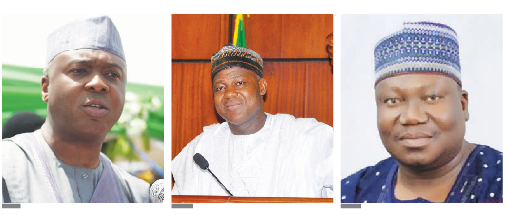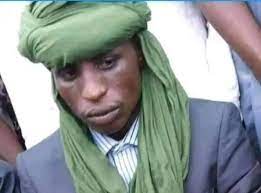Though APC leadership crisis in the National Assembly appears to have been settled following the intervention of President Muhammadu Buhari, penultimate week, Editor, Politics/Features, EMEKA ALEX DURU, and Assistant Editor (North), CHUKS EHIRIM, take a look at other unresolved issues that may work against the party in future.
Supporters of the ruling All Progressives Congress (APC) from different parts of the country filed out in ululation on Tuesday, July 28, when it emerged that the leadership crisis within the party in the two chambers of the National Assembly had been resolved, at least in the House of Representatives.
The understanding was achieved when the Speaker, Yakubu Dogara, announced Femi Gbajabiamila (APC, Lagos) as the Majority Leader of the eighth House, thereby ending weeks of bickering in the House over allocation of offices.
 Dogara also announced Buba Jibrin (North Central) as the Deputy House Leader, Alhassan Ado Doguwa (North West) as the Chief Whip, and Pally Iriase (South South) as Deputy Chief Whip.
Dogara also announced Buba Jibrin (North Central) as the Deputy House Leader, Alhassan Ado Doguwa (North West) as the Chief Whip, and Pally Iriase (South South) as Deputy Chief Whip.
The development followed series of meetings with President Muhammadu Buhari and the leadership of APC the previous day. During the meeting, Buhari, according to a reliable source, had admonished the leaders of the party and the lawmakers on the need to toe the line of discipline and party supremacy. The president reportedly gave both parties 24 hours within which to resolve their differences in the interest of the country as well as the party.
Road to the impasse
The APC was thrown into crisis on June 9, the day the eighth National Assembly was inaugurated, following the failure by anointed candidates of the party to clinch principal offices of the parliament. While the party leadership favoured Ahmed Lawan as Senate President and Gbajabiamila as Speaker of the House of Representatives, Bukola Saraki and Dogara, clinched both positions.
This did not go down well with those who lost out in the contest as well as their godfathers who felt they had lost out in the power game.
In a bid to fight back and remain in contention, they insisted on getting the remaining principal offices for their loyalists within the two chambers.
In the Senate, the party had listed Lawan as Majority Leader, Sola Adeyeye (Chief Whip), George Akume (Deputy Majority Leader) and Abu Ibrahim (Deputy Chief Whip). APC, in making the recommendation, had argued that carrying the listed senators on board would go a long way in assuaging the feeling of bitterness in their group over the June 9 emergence of Saraki where they did not participate.
For the House of Representatives, the party had recommended Gbajabiamila (Majority Leader), Alhassan Ado Doguwa (Deputy House Leader), M.T. Monguno (Chief Whip) and Iriase (Deputy Chief Whip).
Saraki and Dogara, however, disagreed, preferring to have legislators in their camps occupy the remaining slots.
In the Senate, Saraki announced Ali Ndume as Senate Leader, Bala Ibn Na’Allah as Senate Deputy Leader and Francis Alimikhena as Deputy Chief Whip.
The situation in the House took a more frightening dimension as rancorous members disrupted its session and physically assaulted each other over the election of principal officers.
Members broke into two factions, one supporting the ruling party, which sought to choose the principal officers, and another, backing the Speaker, who insisted on defying the directive. In apparent attempt to defuse tension, the House adjourned till July 21.
But even with the adjournment, there were no indications that the fire in NASS would be extinguished amicably. If anything, it was apparent that deep crisis of confidence had been instilled in the members. It was in this regard that the resumption date, which was originally scheduled for July 21, was shifted to July 28.
Even with the new date, the tension in the lower lawmaking house remained high. While the leadership of the APC stuck on the list it had forwarded to the Speaker, the latter insisted on his own team. Dogara, pointedly, said his Consolidation Group had adopted Doguwa as the House Leader, while Jibrin was named his deputy. Iriase was pencilled as Chief Whip, while Chike Okafor was slated for the post of the Deputy Chief Whip.
He had explained his configuration on the need to reflect the federal character principle and to give all the six geographical areas in the country sense of belonging in the House’s power equation. APC would still not have its way.
Buhari to the rescue
It was against this backdrop of uncertainty that Buhari struck penultimate week. In his meeting with the lawmakers, he was said to have reminded them of the rare opportunity they had out of 170 million Nigerians to be elected to their various positions. This, he said, demanded that they put the nation above their individual interests. TheNiche gathered that it was the intervention by Buhari that saw Dogara making a shift that resulted in the emergence of other principal officers in the house.
South East as sacrificial lamb
On the surface, the president’s involvement seems to have doused the fire in the legislature. Analysts, however, note that in doing that, the South East geo-political zone, again, had come on the slab as victim of APC power play. By the new arrangement, no South Easterner was included in APC leadership in the House.
“This is clearly unfair to the South East zone. There is no how the action by the APC leadership can be explained. The so-called ranking membership principle as basis for attaining leadership position in the House or Senate does not, after all, exist in our constitution. Even at that, if the Senate could bend backwards and concede the position of Minority Leader to Godswill Akpabio, even with his newness in the chamber, it will be difficult for the House to explain its failure to have done so. It is against the principles of justice and equity for APC to have completely excluded the zone in its leadership structure in the house. This has gone beyond marginalisation; it is now an obvious case of exclusion,” observed Babatunde Ibidun, a Lagos lawyer, in a chat with our correspondent.
He, however, blamed South East members of the party for keeping quiet in the face of their obvious marginalisation. According to him, Senator Chris Ngige, Ogbonnaya Onu, George Muoghalu, Osita Izunaso, Ezekiel Izuogu, Governor Rochas Okorocha and other senior members of the party from the zone should cry out, stressing that if they continue to keep quiet because of what they hope to get from the party, by the time the power game is over, they would realise that they may just get crumbs or nothing at all.
“This is what works for South West politicians. They have their foibles, no doubt, but you cannot take away the fact that they know when to cry out, especially if they feel being chiselled out of contention. I recommend the same strategy to our South East brothers and sisters in APC. If possible, they should blackmail the government. A threat of pulling out of the party can even do the miracle for them. But for whatever it is, they should speak out because the system is clearly unfair to them,” he added.
Many hold this view, especially given the fact that with the new set-up, it is the South East that has no voice in APC leadership in the House. South West has two principal officers – the Deputy Speaker, Yusuf Lasun, and Gbajabiamila.
Emerging pattern in Buhari government
The bizarre development in the House leadership arrangement did not come to perceptive followers of the emerging trend in the Buhari administration as a surprise. If anything, it squarely fell into what is gradually emerging as a pattern in the administration that has left the South East with the wrong end of the stick.
On Monday, July 13, for instance, the president announced appointment of service chiefs and the National Security Adviser (NSA) to take over from those who had served under the Goodluck Jonathan administration. Under the new dispensation, Major-General Abayomi Gabriel Olonishakin is the new Chief of Defence Staff (CDS) replacing Air Chief Marshal Alex Sabundu Badeh; Major-Gen. Tukur Yusuf Buratai, Chief of Army Staff (COAS), took over from Lt.-Gen. Kenneth Minimah; Rear Admiral Ibok-Ete Ekwe Ibas, Chief of Naval Staff (CNS), replaced Vice Admiral Usman Jibrin.
Also named were Air Vice Marshal Sadique Abubakar, Chief of Air Staff (CAS), as replacement for Air Marshal Adesola Amosu; Air Vice Marshal Monday Riku Morgan was appointed Chief of Defence Intelligence (CDI), while Major-General Babagana Monguno (rtd) was named NSA, taking over from Col. Mohammed Sambo Dasuki (rtd.).
Part of the criticism on the appointment was that out of the six security appointments, four were from the North, while only two are from the South.
Buhari, since taking over the reins of power on May 29, has, so far, made not less than 17 critical appointments, out of which perhaps only three came outside the North. None, curiously, came from the South East.
It is against this backdrop that critics interpret the composition of the House leadership as falling in line with what is increasingly assuming the dimension as an exclusionist policy against a particular group or people by the administration. What particularly added weight to this suspicion was the statement credited to the president in his recent visit to the United States of America (U.S.A.), where he was quoted to have stated that he should not, ordinarily, be expected to extend the same attention to areas that gave him 95 per cent votes with those that gave him paltry five per cent during the election.
Oyegun defends Buhari
APC National Chairman, John Odigie-Oyegun, however, absolved the Buhari administration of sectional bias, urging the South East not to lose hope yet, as something bigger may still come their way.
“The party did not sacrifice the South East to solve the crisis,” Oyegun said. “The sharing process is not over. Even in the House of Representatives, it is not yet over. All these will be taken into consideration when other positions in the House are being distributed.”
According to him, “What is important is that the system functions. The system went out of gear with the first election made. So the planning of the party was thrown out of sync. So you have to walk back and resolve it as best as possible given the circumstances.”
How far this may go in assuaging obviously fractured sentiments may need to be seen in the days and weeks ahead.
The battle ahead
But having achieved relative peace in the House of Representatives, the party is yet to achieve same in the Senate. The Lawan group, for one, still insists on taking the battle to a full course. penultimate week, there were still insinuations of the camp taking its case to the courts. Members of the camp were also, reportedly, not enchanted by the composition of three special committees set up by the Senate President. Saraki, on the other hand, is said to be looking beyond the agitation by the Lawan group, but instead, working on how to keep the upper lawmaking house running in its core legislative business. Analysts thus predict more rancorous days ahead in the affairs of NASS, especially in composition of standing committees and gradual build-up to 2019 politics.













